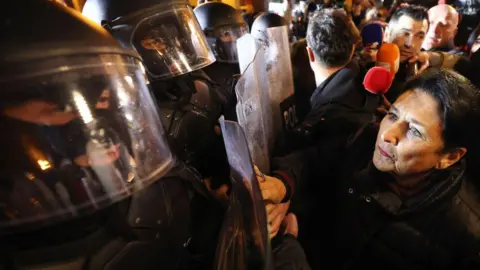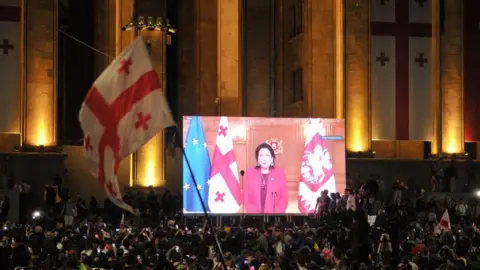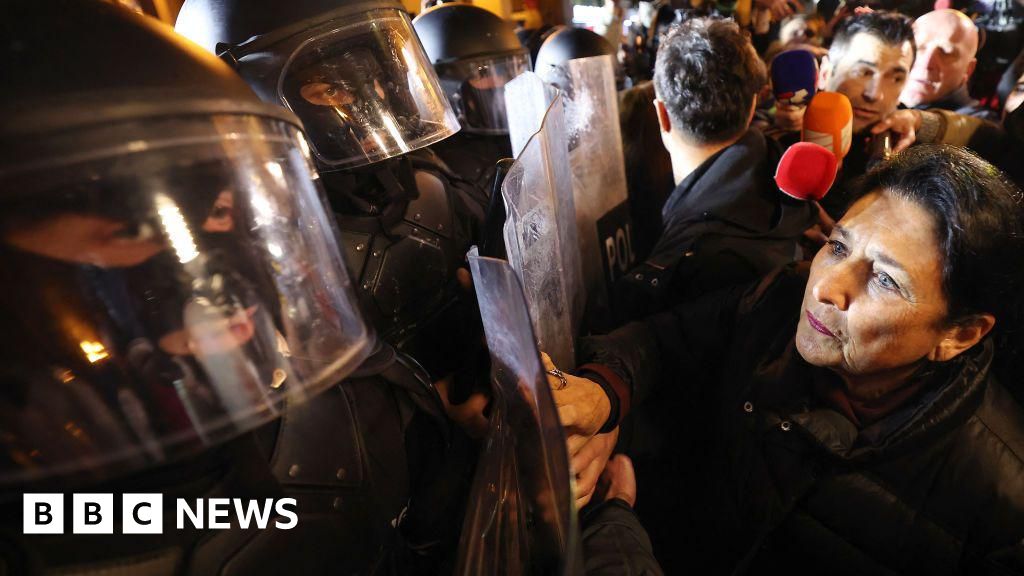 Getty Images
Getty ImagesSalome Zourabichvili’s family fled Georgia in 1921 after Soviet forces snuffed out the country’s three-year experiment with independence from Russia.
A century later, Georgia’s pro-Western president is refusing to leave office, arguing she is the last legitimate institution in her country,
On Sunday, her six-year term as president is due to end. According to a new system for selecting the head of state, on that day she will be replaced by former Manchester City footballer Mikheil Kavelashvili, chosen with the support of the governing Georgian Dream party.
Zourabichvili, 72, has denounced his election under an electoral college system in which he was the only candidate as a travesty.
When she became president in 2018 she was endorsed by Georgian Dream, but she has since condemned their contested election victory in late October as a “Russian special operation” and backed nightly pro-EU protests outside parliament.
The government says if she refuses to leave office she will be committing a crime.
If she is forced out, she says the ruling party’s takeover of the state will be complete and Georgia will have surrendered its sovereignty to a party that she accuses of serving Moscow.
‘A mythical place’
Salome Zourabichvili was born in France in 1952 into a prominent family of Georgian émigrés. Her grandfather, a minister in the government of briefly independent Georgia, fled to France in 1921.
Georgia, then under Soviet rule, loomed large in her childhood. It was a “mythical place, which only existed in books,” she said in a 2004 interview.
Though raised in a culturally Georgian environment, speaking the language at home and attending Georgian Orthodox church services, she easily integrated into French culture. She attended France’s elite schools, including Sciences Po, traditionally a feeder for the country’s top public servants.
She excelled, serving as a French diplomat for nearly 30 years. But throughout, her true passion remained in extricating her parents’ mysterious country of origin from Russia’s influence and bringing it closer to the West.
“She sees it as her life’s mission to bring Georgia into Europe. Everything else for her has always been secondary,” said Alexandre Crevaux-Asatiani, a former Zourabichvili aide.
In 2003, she was appointed French ambassador to Georgia. A year later, she was granted Georgian citizenship and made foreign minister under President Mikheil Saakashvili. Dismissed in 2005, she took an increasingly prominent role in her adopted country’s politics, founding a new party.
Saakashvili’s rule ended in 2012 and Georgian Dream have been in power ever since. The party’s founder, billionaire Bidzina Ivanishvili, is widely seen by Georgians as the most powerful man in their country. By a quirk of fate, he is also French, having taken citizenship in 2010.
Backed for the presidency by Ivanishvili’s party, Zourabichvili was initially unpopular among the country’s pro-Western youth. A popular TV show mocked her halting Georgian, spoken with a strong French accent.
 Getty Images
Getty ImagesShe was seen as aligned with the ruling party, unpopular with many young people, and she blamed a short war with Russia in 2008 on Georgia allowing itself to be provoked.
But as her presidential term progressed, Georgian Dream took an increasingly authoritarian and anti-Western turn, cracking down on civil society and NGOs. It refused to join Western sanctions on Russia after the full-scale invasion of Ukraine, and called the West the “global war party”, making a mockery of its stated aim of joining the EU and Nato.
Zourabichvili openly defied the government, believing she had the support of the majority of Georgia’s population.
She pledged to veto a bill on “foreign influence” that mirrored Russian legislation passed under President Vladimir Putin, but the government passed it anyway, defying weeks of protests.
“The choice for Georgia is between independence or slavery, Europe or Russia,” she said in April.
She has often addressed the protesters who have turned out every night for a month outside parliament, casting them as the conscience of the nation against a Russia-friendly government.
Last month she asked riot police, accused by the opposition of brutalising protesters: “Are you serving Russia or Georgia?”
Many protesters, initially distrustful of the president for coming to power with Georgian Dream’s backing, came to respect her outspoken opposition.
“No-one expected her to be this good. She reflects our values,” said Irakli, a 34-year-old who has been regularly demonstrating. “She motivates us to fight.”
Ahead of October’s contested elections, the government tried to impeach her for meeting EU leaders without government authorisation. Ultimately the effort failed but it was an indication of the showdown to come.
Zourabichvili called the elections, which returned Georgian Dream to power, “totally falsified”. She backed opposition parties’ calls for a re-run, drawing the ire of senior party leaders.
‘Let’s see where she ends up’
She now faces perhaps her biggest challenge so far, as Georgian Dream prepares to install her replacement, Mikheil Kavelashvili, as president.
But Zourabichvili has insisted she will not go, setting up a likely constitutional crisis. Georgian Dream Prime Minister Irakli Kobakhidze has threatened her with arrest.
“Let’s see where she ends up, behind bars or outside,” he told reporters this week.
The government is likely to force her to leave one way or another, said Petre Tsiskarishvili of the opposition United National Movement.
Conscious of not wanting to make her a political martyr and elevate her profile further, it may avoid a high-profile arrest, he added, perhaps merely locking her out of her official residence at the Orbeliani Palace.
Doubts towards her will persist. Some in the opposition blame her for providing a pro-European face to Georgian Dream’s authoritarian turn for far too long, refraining from criticising Ivanishvili until only a few months ago.
But in a country where pro-European forces have often been fractured, Zourabichvili’s supporters say she is likely to emerge from her term in office as a key opponent to the government.
“Even if she is arrested, she will still be considered the legitimate president of Georgia. There is no question about it,” said Mr Crevaux-Asatiani, the president’s former aide.


Leave a Reply